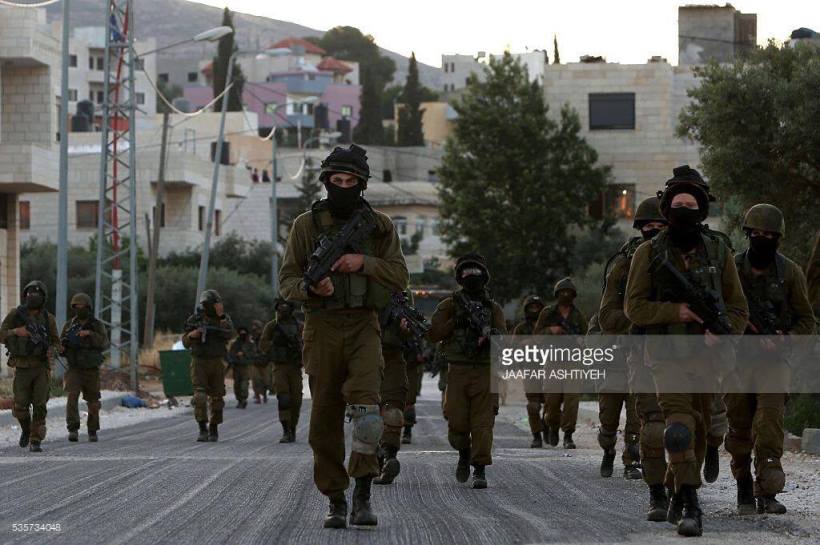“I’ll be going to Layla Lavan.”
“Jesus, going straight into Layla Lavan? You haven’t worked with these guys before?”
“I can’t, you know? With Ulpan and work.”
“I get it, your schedule is full.”
“I mean, I’ve been training everyday, sometimes with friends and most times solo, working myself as much as I can.”
“You’ll be fine, it’s just-”
“It’ll be a baptism by fire.”
“Yes, exactly.”
“Is it difficult? ” I asked, knowing just how unnecessary the question was, but wanting to get as real of an answer as I could.
“Layla Lavan (white night), or tironut (training) in general?”
“Tironut.”
“It’s extreme, but do you know how to keep on?”
“Mental.”
“Yes, exactly. Shoot for as high as you can. The training is a bitch, but listen Nachshon, it’s worth it. In kravi what you’ll be doing for majority of the time is holding a part of the border. The days are long, but you do jack. Nothing. The only part you need worry about getting through is tironut. If you can survive tironut, it’s cake. It’s so good and rewarding. The army rewards hard work. You even go home on Thursdays for an extended shabbat.”
“B’emet?”
“Really. Go to the beach, have dinner with your family, fuck your girlfriend, whatever. Get back to the grind on Yom Rishon and repeat for seven months until you’re combat ready.”
He pulls a video up on his phone; a rabble of olive-drab warriors in boonie hats standing before wet earth caked in mud.
“Achat shteim shalosh!”
The soldiers jump forward and smack prone in the mud, their elbows and knees jerking forward in the thick, sinking ground, rifles held above the clay.
“Is that a Galil?”
“Negev.”
I continued to watch in awe as the full-gear heavyweights confidently pushed their way through such hampering obstacles like tanks on asphalt.
“…During war week, you’ll sleep every other day. Not much, two hours tops, but your body is going to soak up as much rest as possible. During the days, the m’faked will hand out maps with topography and shit on them.”
“Okay.”
“You’re going to go through hellish marches, and will be expected to always stay on alert. If a time comes where the group stops, there is no sitting. You kneel with your rifle in your arms. But after these little missions are finished, you’re going to want to lay around. Don’t. Study the maps as much as you can. By the end of the day, the m’faked will send you out and you need to know exactly how to get back to base. …But honestly, during most marches, you’re expected to carry your rifle at your shoulder at all times, you know, ready to shoot.”
“Yeah.”

“But, much of the time I’m walking with my arms tucked in my pockets. That’s not how it is in a real combat situation. You’ll know and feel the difference. Last week, we were moving through a Palestinian village looking to arrest a man who was selling weapons. We couldn’t find him all night, but we had other suspects.”
“Yeah?”
“Do you know what we found? In one suspect’s house, business cards tucked in a stand belonging to a journalist.”
“Is that who took the photo?”
“Yes. At about five AM we were leaving the village, and ahead of us a man was on the ground setting up a tripod. That is why we wear the masks.”
“To protect your identity.”
“Exactly. You cannot touch them, bother them, destroy their camera, by law. You just ignore them and move on. …I’m in the photograph somewhere. Don’t remember where I was. See the guy with his hand over his eyes?”
“Is that you?”
“No, don’t think so. But he’s hiding, you don’t want to be too familiar in the West Bank.”
“It looks difficult. Exhausting. But this was my intention all along. And I’ve always doubted myself, my poor Hebrew, my body, my upbringing.”
“That will all fade soon. I can already tell that you’re one of us, you’re a brother. Honestly, don’t doubt yourself.”
That changed when I came here. Do I have fear? Yes I do. Not of the physical challenges, not of the gibush. I fear for losing myself, who I am in the place I came to find who I am. I made this clear to my American-Israeli friend as we nursed Macabi Beer while pounding shots of whiskey and rolling cigarettes; he called me brother.
The humid night brought in a hazy smog which cradled itself in the Jezreel Valley, likely from the ammonia plant east of Haifa. It fortified the deep feeling of strangeness, one of life’s inevitable turns that leave permanent marks on the always-changing, pliable human conscious. The alcohol wears off in the middle of the night as I lay, looking out the iron-paned blinds of my bomb-proof window, as the haze dissipates and the sun burns the dark away.
Ghosts and unwelcome memories linger, I feel I look down on them from a lonely mountain’s crest. But it is a another day, another chance, a new time under the sun to fulfill the unforgiven minute with sixty seconds-worth distance run.